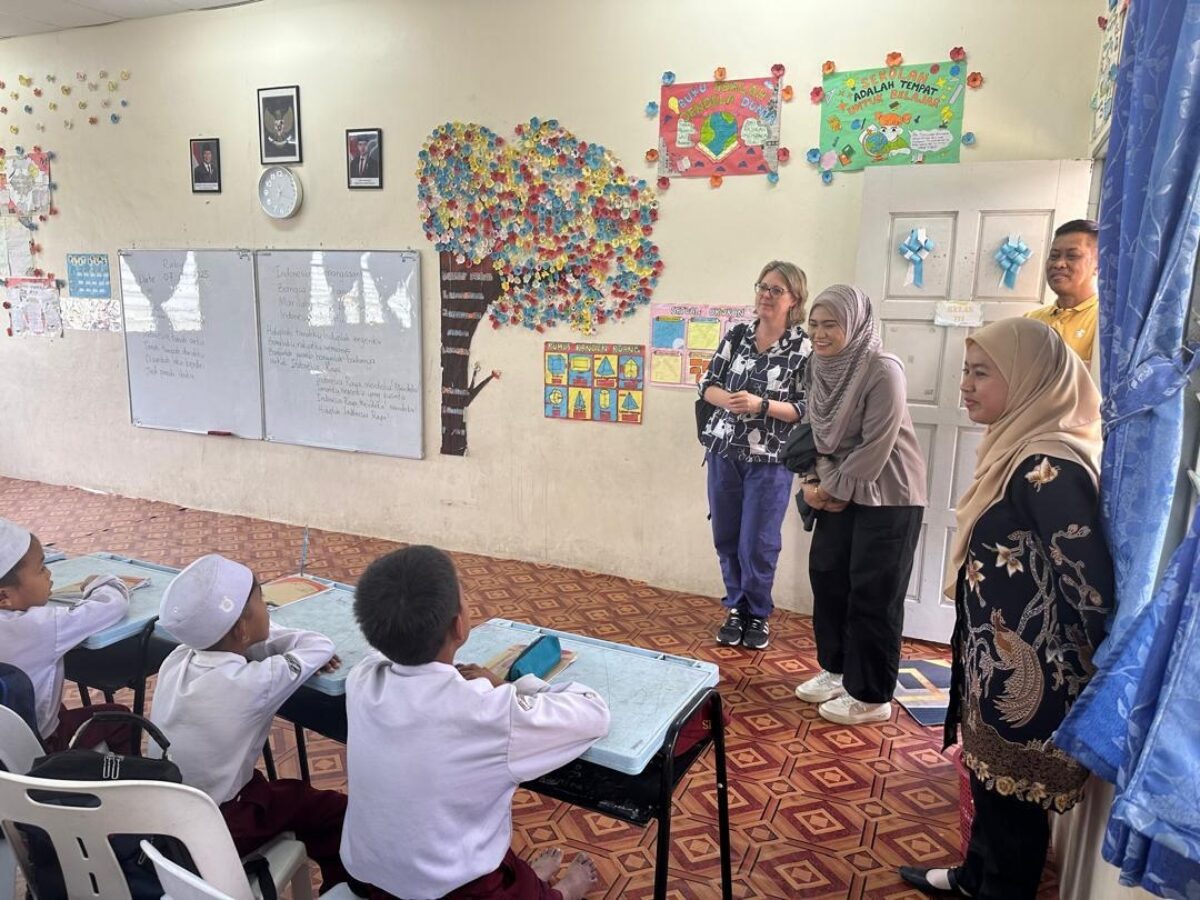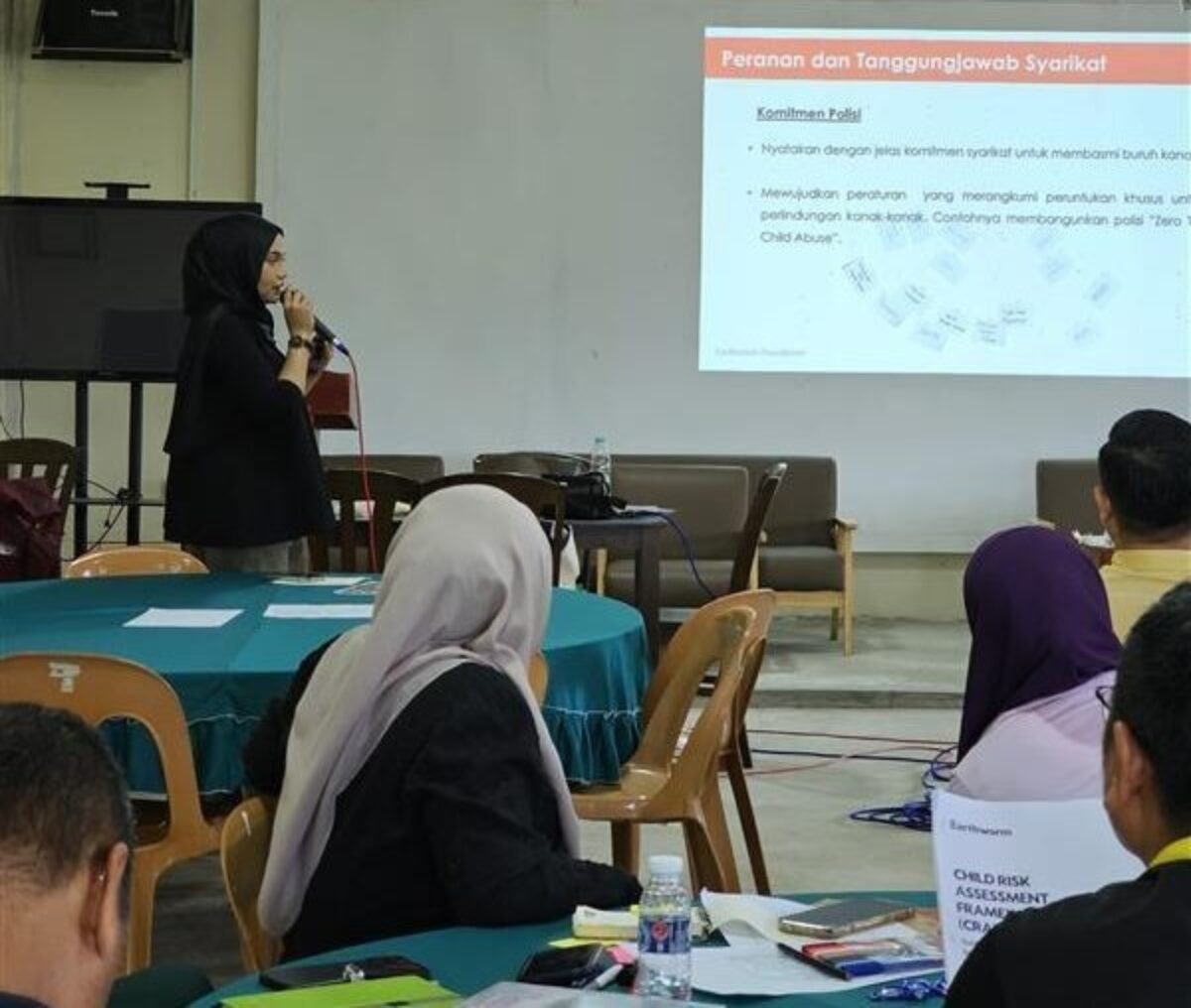A blog piece by Nurfarhani Abdul also known as Hani, a passionate child rights practitioner from Sabah Landscape, Malaysia. Hani has led the development of child-centred approaches within plantation landscapes, becoming a key force behind Earthworm Foundation’s mission to embed human rights at the heart of sustainable transformation in the palm oil sector.
Working at Earthworm Foundation has been more than a job, it has been a journey of listening, learning, and standing alongside plantation communities whose voices are often unheard, while engaging directly with palm oil plantation companies to drive change.
My role as Project Lead for the Children in Plantations Program has been about building bridges between business and human rights, ensuring that sustainability includes protecting the rights and well-being of children who lives on palm oil plantations.
In Peninsular Malaysia, children of foreign workers are rarely found in plantations because stricter rules prevent families from accompanying workers. However, in Sabah, the situation is different. Many migrant workers in Malaysia come from countries such as Indonesian and the Philippines and their children migrate with their parents, sometimes through official channels, sometimes irregularly and some are even born in Sabah.
The existence of children living in palm oil plantations in Sabah is well known. These children are shaped by invisible barriers such as poverty, migration status, and the legacy of systems that often neglect them.
Some of them carry buckets before they ever carry books, and others grow up without birth certificates, rendering them invisible to the very institutions designed to protect them, often times from a lack of awareness. These realities are painful, yet they serve as powerful reminders of why our work matters and how meaningful change begins with acknowledging the barriers children face in accessing their rights.

Through Earthworm's Children in Plantations Program, I have worked to embed child-centred approaches into company policies and operations, whether through child risk assessments, capacity building training, or participatory dialogues with workers and families. . These efforts are about shifting mindsets so that protecting children becomes part of what sustainability truly means.
At Earthworm, I have learned that human rights work is not just about compliance, it is about empathy. It is about seeing the child behind the statistic, and the community behind the supply chain. It is about believing that plantations can be places of growth not just for crops, but for children’s futures. There’s a clear difference between setting up a Community Learning Centre (CLC) simply to fulfil a Malaysian Sustainable Palm Oil (MSPO) requirement and intentionally creating a space where children feel safe and supported. I’ve seen how this shift, from obligation to empathy, can turn a basic facility into a nurturing environment that supports not just children’s development, but the confidence and dignity of the community as well.
One of the most meaningful aspects of my work has been helping companies understand that child protection is a responsibility that strengthens their credibility and long-term business resilience. When plantation managers begin to ask how their operations effect children’s access to education, or when workers feel supported to raise concerns about their children, I see the seeds of transformation taking root.

Together with my team and with the companies we work with, I have been conducting capacity building trainings for plantation companies using our Child Risk Assessment Framework (CRAF) Toolkit, and delivering child protection training for palm oil suppliers. These sessions, besides the opportunity to share knowledge, are about reshaping perspectives in industries where children’s realities are often invisible. They spark vital conversations about access to education, safe housing, and the responsibility companies carry to prevent child labour.
Leading the CRAF Capacity Building Program has been an incredibly rewarding experience for me. Through this program, I have seen how transformative it can be when a company chooses to go beyond mere compliance and invests in the well-being of its workers and their families. Our program includes a self-assessment component, but the participating company demonstrated that its commitment extended beyond a procedural exercise.
What stood out the most was the genuine support from plantation management, they not only provided space and resources but also showed their full commitment by establishing a CRAF Committee and appointing dedicated staff to lead the internal efforts. This level of ownership signifies a shift from passive participation to active leadership.
Policies are essential but real change doesn’t happen just because a policy exists on paper. It happens when people internalize its values, take ownership, and act with intention. I’ve seen how committed leadership can transform workplace culture and practices. Not just from non-compliance to compliance, but from indifference to care. When plantation managers truly believe in the principles behind a policy, they don’t wait for audits or external pressure. They lead by example, empower others, and create space for meaningful change to take root. That’s when a policy becomes more than a document, it becomes a shared commitment.
I’ve come to understand that change doesn’t begin with policies alone, it begins with people.
This journey is challenging. It involves navigating resistance, clarifying stakeholder roles, and consistently advocating for systemic change in environments that are slow to evolve. There are days when the weight of it all feels overwhelming, especially when progress seems stagnate. However, I remain hopeful because each child protected, every parent empowered, and each improved policy represents a step toward transformation.
Change in this industry may take years. Companies often face competing pressures, and progress can be slow. But each step, whether it’s a new policy, a safer practice, or a commitment to community engagement represents progress. Behind every policy shift, I think of the children whose lives may be a little safer, whose futures may be a little brighter. For me, these moments affirm that our work is not only about speaking for children, but also about equipping palm oil companies to act responsibly on their behalf. By strengthening the capacity of plantation companies and suppliers, I am helping to build systems where children’s rights are safeguarded not as charity, but as a core principle of sustainability.
Plantations are often seen only as places of production, but for me, they are also living landscapes where children grow, families build their futures, and communities carry their traditions.
Importantly, our work in Children in Plantation Program is supported by brands and palm oil producer who believe in the urgency of protecting children in plantations. Their commitment allows us to strengthen partnerships with companies, expand training, and ensure that child rights are embedded not only in policies but in everyday practices. This support is a reminder that safeguarding children is a shared responsibility, one that requires collaboration across communities, businesses, and global allies.
--
Positioned at the intersection of supply chains and production regions, Earthworm's landscape-scale collective actions serve as hubs for scalable regeneration and address sustainability challenges. For more information about the project, visit our Sabah landscape page.


